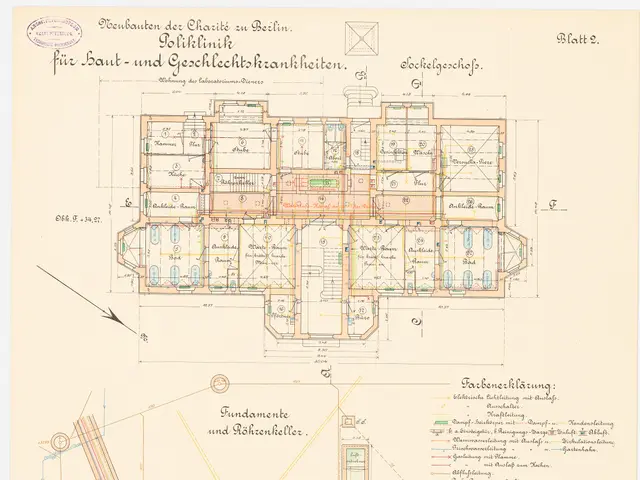Adult manifestations of the Respiratory Syncytial Virus (RSV)
New RSV Vaccines Approved for High-Risk Adults
Respiratory Syncytial Virus (RSV) is a common respiratory infection that usually affects children, but it can also pose a significant threat to adults, particularly the elderly and those with underlying health conditions. Here's what you need to know about RSV, its symptoms, and the new vaccines available to help prevent it.
Adults can pass RSV on for 3-8 days, and it can transmit via contact with respiratory droplets or by touching affected surfaces. Symptoms in adults include runny nose, nasal congestion, fever, sneezing, wheezing, sore throat, fatigue, and watery eyes. While most RSV infections in adults resolve within 1-2 weeks, severe cases can be life-threatening, requiring hospitalization.
Adults at the highest risk of severe RSV include those who are over age 65, immunocompromised, or have heart or lung diseases. It's important to note that an adult cannot know if they have RSV without a lab test.
To combat the threat of RSV, three FDA-approved vaccines are now available: RSVPreF3 (Arexvy; GSK), RSVpreF (Abrysvo; Pfizer), and mRNA-1345 (mRESVIA; Moderna). The CDC currently recommends a single dose of any of these vaccines for all adults aged 75 years and older, adults aged 60 to 74 years who are at increased risk of severe RSV illness, and adults aged 50 to 59 years who are at increased risk, including those with chronic conditions such as heart disease, diabetes, asthma, COPD, weakened immunity, and other relevant health issues.
Arexvy and Abrysvo were approved in May 2023, while mRESVIA received approval in May 2024, pending expanded approval for the 50+ age group. It's important to note that these vaccines are administered as a single dose only, with no current guidance for routine repeat doses.
Dehydration can worsen symptoms of RSV and may require hospitalization if severe. A fever accompanying an RSV infection will typically be low grade, but adults should seek immediate medical attention if their fever goes over 103°F (39.4°C). Wheezing can make breathing difficult, especially for adults with health issues such as asthma or other lung conditions.
A 2022 study of RSV in adults found that a significant number of people with a previous RSV infection experienced decreased activity while sick. Poor appetite is a common symptom of RSV in adults, and many participants in the study who were working at the time of the RSV infection reported they were unable to work during their illness.
In most adults, RSV will cause mild cold- or flu-like symptoms. However, of those hospitalized for severe RSV infections, 6,000-10,000 die due to an RSV infection each year in the United States. Bluish skin on the lips and nails may indicate an RSV patient is not getting enough oxygen and requires emergency attention.
In summary, the recommended RSV vaccines for adults in the United States are Arexvy (GSK), Abrysvo (Pfizer), and mRESVIA (Moderna). If you are or represent someone in the recommended age and risk categories, a single-dose RSV vaccine from one of these brands is the recommended preventive measure. Stay hydrated, seek medical attention when necessary, and protect yourself and others from the effects of RSV.
| Vaccine Brand (Manufacturer) | Recommended Age Group for RSV Vaccination | Notes | |------------------------------|-------------------------------------------|--------------------------------------------| | Arexvy (GSK) | 50+ with risk factors; 60-74 at risk; 75+ all | First approved in May 2023 | | Abrysvo (Pfizer) | Same as Arexvy | Approved May 2023 | | mRESVIA (Moderna) | Same as Arexvy, approval awaits for 50+ group | Approved May 2024, pending expanded approval |
- The Respiratory Syncytial Virus (RSV) primarily impacts children but can threaten adults, specifically the elderly and those with medical conditions.
- Transmission of RSV occurs via contact with respiratory droplets or contaminated surfaces for 3-8 days.
- Adult symptoms include runny nose, congestion, fever, sneezing, wheezing, throat irritation, fatigue, and watery eyes.
- Severe RSV cases necessitate hospitalization, mainly for those with chronic diseases and the elderly.
- High-risk adults include those over 65, immunocompromised, or those with heart or lung diseases.
- Not everyone aware of having RSV without lab tests.
- Three FDA-approved vaccines include RSVPreF3 (Arexvy; GSK), RSVpreF (Abrysvo; Pfizer), and mRNA-1345 (mRESVIA; Moderna).
- The CDC recommends one dose for adults aged 75 and older, 60-74 at increased risk, and 50-59 with health issues like diabetes, asthma, and COPD.
- Approval dates for these vaccines are May 2023 for Arexvy and Abrysvo, while mRESVIA received approval in May 2024, pending expanded approval.
- Vaccine doses are administered once and do not require additional routine doses.
- Prolonged symptoms of RSV can lead to dehydration and hospitalization.
- A fever over 103°F (39.4°C) with RSV requires immediate medical attention.
- People with asthma or lung conditions may struggle with wheezing, making breathing difficult.
- A 2022 study found that many adults with RSV experienced reduced activity and poor appetite, impacting their ability to work.
- Annually, approximately 6,000-10,000 people die due to severe RSV in the United States.
- Bluish skin on the lips or nails may indicate an RSV patient is not receiving enough oxygen and requires immediate attention.
- In the majority of adults, RSV causes mild cold- or flu-like symptoms.18.It is important to prioritize hydration, seek medical attention when necessary, and take preventive measures against RSV.
- Workplace wellness programs can help educate employees about the risks of RSV and encourage them to get vaccinated.20.Chronic diseases like chronic kidney disease and skin conditions can increase an adult's risk of developing severe RSV.
- Progress in science and technology has led to advancements in RSV vaccines and therapies, offering hope for better protection.
- A good night's sleep is crucial for the body to recover from illness and maintain overall health.
- Fitness and exercise can strengthen the immune system and improve respiratory health.
- The manufacturing industry plays a vital role in creating vaccines, medicines, and medical equipment to combat RSV and other medical conditions.
- Mental health often suffers during chronic illnesses, including extended recovery periods from RSV.
- Skin care is essential to ensure that skin conditions do not worsen or develop during illness or treatment.
- A variety of therapies and treatments can alleviate the symptoms of RSV, making recovery more bearable.
- Balanced nutrition is essential for overall health, as malnutrition can weaken the immune system and hinder recovery from RSV.
- As we age, our bodies become more susceptible to viruses like RSV, emphasizing the importance of taking preventive measures and maintaining a healthy lifestyle.








